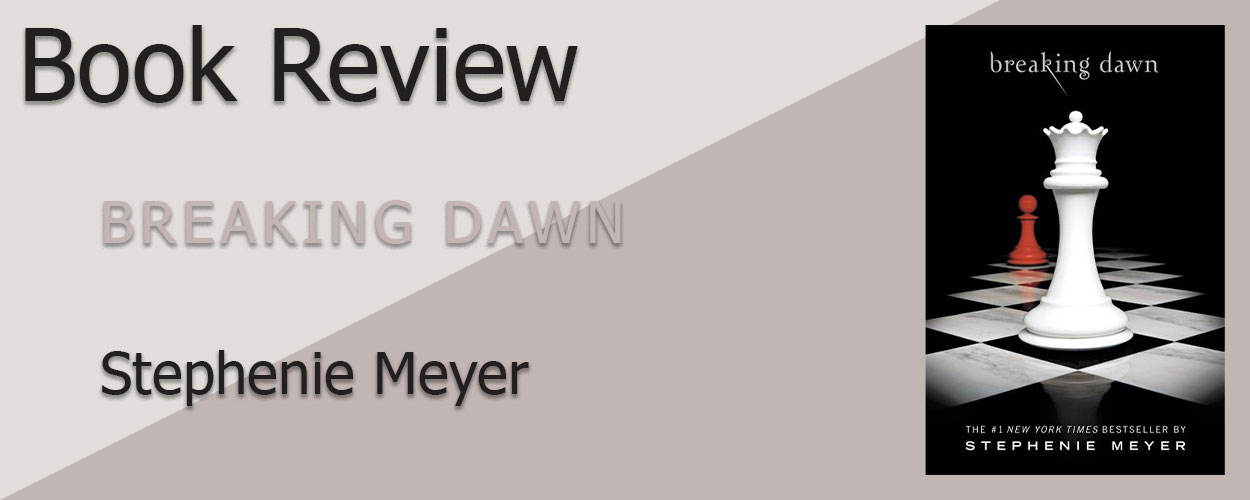

I liked it
This is the last official book of the Twilight Saga, but I still have the companion novel Midnight Sun to read after this. After that, I’ll watch all the movies; I’ve been avoiding watching then so as not to affect my impression of the books.
Read: October 9 – October 13, 2023
Genre: Fantasy, Supernatural
Audience: Teen/Young Adult
Book contains: kissing, allusion to sex; innuendos; difficult pregnancy
Purchase a copy from Amazon.ca
Everything seems to be in Bella’s favour. She’s marrying Edward, then finally able to join him for eternity as a vampire. The only problem is Jacob, who disappeared after receiving her wedding invitation and who no one’s seen since—not even his father. She can’t help but worry about him and, if they ever see each other again, how their relationship will be changed, not only because of her marriage, but of her imminent transformation as well and all that entails.
My first impression of the book was what’s there left to do? Of course, we still had Bella and Edward’s wedding to go through, and Bella’s transformation into a vampire (both to fulfill her desire to stay with Edward forever and to satisfy the Volturi’s concerns about secrecy). Jacob also ran off into the woods at the end of the last book, so hopefully we’d learn more about what he was up to. Then, of course, something happened near the beginning of this book that set the stage for the rest of the story, adding so much more content than just a vampire transformation. It was interesting, but not to my taste—and also included some weird quirks, which is why I rated this book lower than the others. I enjoyed it a lot more near the end, though only the last quarter or so of the book.
While listening along to this book on YouTube, I initially started with Julia Reads Out Loud, but her readalong ended around chapter sixteen, which meant I had to find a new reader for the second half of the book. This new reader came in the form of Tabitha Joy. I enjoyed Tabitha’s reading a lot more, actually, because though she sometimes stumbled over her words, it was rare, and she has a much more friendly disposition.
Unlike the other books, Breaking Dawn begins in Bella’s first-person perspective, then switches to Jacob’s first-person perspective for about a third of the book before returning to Bella’s. It was done in a way that makes sense for the story, in such a way that I wonder what the rest of the books would’ve been like if they’d been done the same way. The first third of the book is very lovey-dovey for Bella, given hers and Edward’s marriage and subsequent honeymoon. Then, Jacob’s section is quite fraught with tension, some anger, and worry over Bella. Once the story switches back to Bella’s perspective again, there’s a sense of newness, then fear as the Volturi become involved once more (like they’d threatened in the previous books). The shifting of tones really helped to set the mood of the different sections and further differentiate the narrators’ voices. Never once was I confused as to whose it was (also helped by the fact that it didn’t switch often).
However, there were things that didn’t sit well with me personally. The other books had these things, too, parts of the lore that made me uncomfortable that I’d never have considered including in my own work as a writer (like with The Mortal Instruments and their implied incest). The imprinting, for one thing, was done strangely; though I can understand it somewhat, I still didn’t enjoy that aspect of the book and thought it could’ve gone without.
Since Bella has now graduated, we step entirely away from her human friends. Mike showed up briefly at the wedding, but other than that, it’s just her father Charlie, and vampires and werewolves. There are a few other temporary human characters which move the plot forward, but they’re forgettable at best. Also, a whole bunch more vampires also appear, so much so that a list for them at the back of the book was needed to keep them all straight.
Edward and Bella’s relationship has a few ups and downs in this book, as all relationships do, but it seems stronger than ever as well, which I can appreciate. Jacob is complicated (what else is new?) but happily they’ve sorted themselves out as the series comes to a close.
Meyer’s writing hasn’t changed. It’s still mid-range for me; simple enough for younger readers to understand, but also nothing too life-changing or thought-provoking. The sentence structure and syntax were rarely confusing or overly complicated, but it still didn’t sing to me like some other books have.
If you’re in this series for the romance, I’d definitely recommend this book, but otherwise, the series ended on a great note with Eclipse.
Vampires in Fiction
Vampires in Fiction II
Werewolves in Fiction
The Twilight Saga Book 1: Twilight by Stephenie Meyer
The Twilight Saga Book 2: New Moon by Stephenie Meyer
The Twilight Saga Book 3: Eclipse by Stephenie Meyer
The Twilight Saga Eclipse Novella: The Short Second Life of Bree Tanner by Stephenie Meyer
The Twilight Saga Book 4: Breaking Dawn by Stephenie Meyer
The Twilight Saga Companion Novel: Midnight Sun by Stephenie Meyer
The Mortal Instruments Book 1: City of Bones by Cassandra Clare
*Dawned by Michelle Areaux*
Tigerpetal Press is a small book press dedicated to publishing local authors and poets.